The Accountability of Armed Groups under Human Rights Law
The starting point for this NWOI funded Ph.D. research is the observation that although UN accountability mechanisms are increasingly holding armed groups âaccountableâ under human rights law, the legal basis for the responsibility of armed groups under human rights law remains controversial Structured into four parts, this study addresses the uncertainty at the core of the debate about whether and when armed groups are bound by human rights obligations. Part I of the study identifies the normative value that human rights law brings to the legal framework that applies in non-international armed conflicts vis-a-vis international humanitarian law. It shows that human rights law brings most value to activities connected to the exercise of authority over persons or territory, the maintenance of public order and the suppression of criminal activity outside the conduct of hostilities. Drawing on social science literature on rebel governance and armed conflict generally, the study demonstrates that there is significant added value in holding armed groups to account under human rights law. Part II of the study brings clarity to the circumstances in which armed groups can acquire obligations under international human rights law. It does this by conducting a comparative and theoretical analysis of the legal personality of armed groups under international humanitarian law, the law of belligerency and the law of insurgency. By analysing these legal frameworks, the study draws conclusions about the material and theoretical circumstances which are required for an armed group to acquire legal personality under human rights law. Part IV of the study brings clarity to how and when armed groups can be held bound by human rights norms. In doing so, the study considers whether the source of an armed groupâs legal obligations under international law are most likely rooted in treaty law, its control of territory, international criminal law or customary international law. Part IV of the study synthesises the studyâs findings to draw conclusions about the circumstances in which it may be justifiable for UN accountability mechanisms to hold armed groups responsible under human rights law.
{{comment.content}}








 京公网安备 11010802027623号
京公网安备 11010802027623号